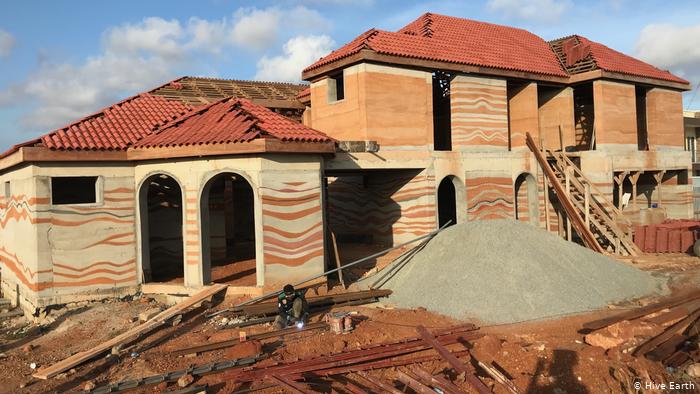Joelle Eyeson, co-founder of Hive Earth, explains the housing challenges in Ghana. Could using the traditional ‘rammed earth’ technique point the way to affordable eco-housing in the future?
DW: What is the mission of your company Hive Earth?
Joelle Eyeson: Hive Earth is a construction company based in Accra, Ghana. I set it up with my business partner in 2016. I was able to bring my background in property management, and they brought their expertise in local materials and the local environment. The whole idea is that we build affordable and eco-friendly housing. We use locally sourced materials such as clay, laterite and granite chippings which are abundantly available in West Africa.
What are the housing challenges in Ghana right now?
There is need for around 2 million new houses in Ghana per year, but most of the building is concentrated in the capital Accra, where land is very expensive. The other issue is that when you build in more rural areas it then becomes expensive to travel to the cities for work. We knew that the majority of people in Ghana have a relatively low wage. We thought it is strange you have workers building these big houses that cost hundreds of thousands of dollars and they could never afford them.
So our aim is to build houses that our workers and the majority of Ghanaians and West Africans can afford. The prototype that should be ready by the end of the year will cost roughly $5,000 for a one-room house.
What exactly is the “rammed earth” technique that you use?
The rammed earth technique is just a mixture of laterite, clay and then granite chippings. We use 5 percent cement to bind it but also do it using lime. We wanted a way of building without using cement, because it is very toxic; especially in our climate it combines with the heat and humidity and creates a really bad indoor air quality.
When we discovered the rammed earth technique we thought it was great because it is basically like the traditional mud house, but updated. It’s a tried and tested technique that’s been around for centuries. Parts of the Great Wall of China were even built with rammed earth.
In what other ways are the buildings eco-friendly?
In Ghana it is so hot you usually need air conditioning systems in your home, but these are not always affordable, eco-friendly, or good for your health. We teamed up with some German engineers who gave us the idea of underground cooling systems. We dig around 8 feet or more until we get to the cool air underground. Then we use a solar pump which is constantly bringing the cool air into the home. Then it is only the cost of the solar pump (around $300) which people need to pay and there are no bills.
Where do you see eco-housing going in the future?
Right now we are only doing individual houses. In the future we would like to be involved in bringing our eco-housing into bigger housing projects and estates.
With our foundation we are also planning on doing more workshops with local communities, helping to teach them the skills of building with rammed earth. We are also planning on building eco toilets. Ghana has a really bad sanitation problem — only around 19 percent of people in Accra have access to a toilet and in rural areas it’s much worse. We want to enable people to come and learn about rammed earth, build something that is beautiful, eco-friendly and useful for their own communities.




